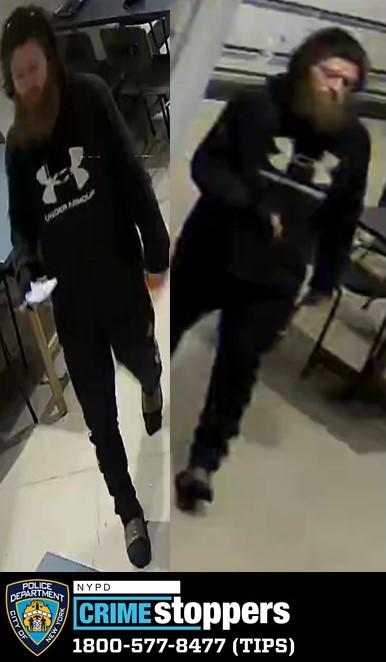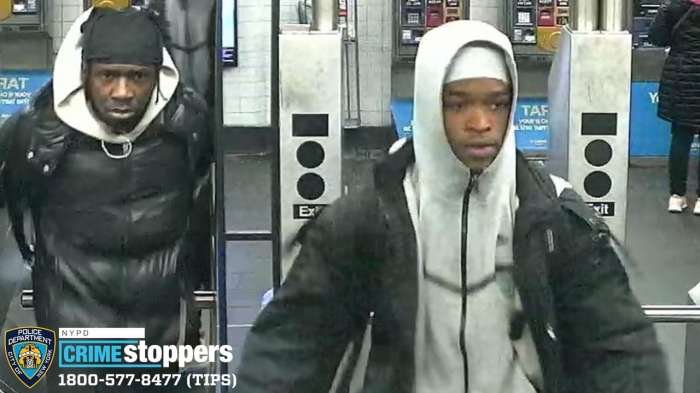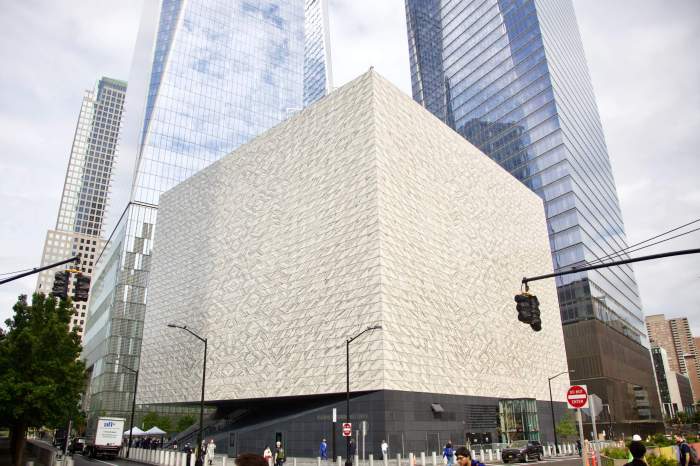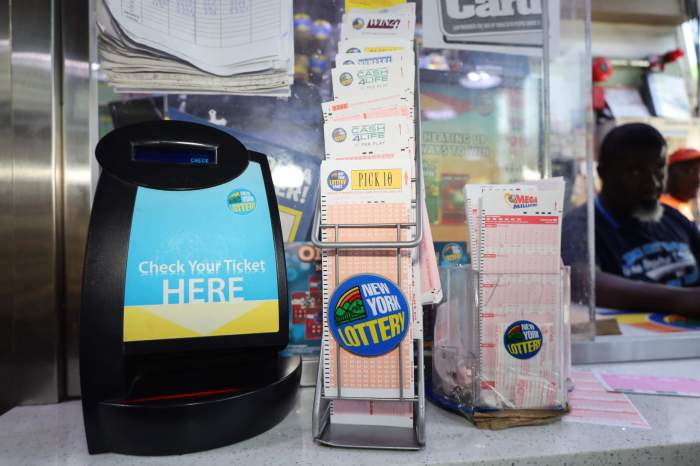Traffic safety
To The Editor:
Re “Fulton St. work is getting dangerous” (news article, July 3- 9):
Yes the street construction in and around Fulton St. has made walking as well as driving an ongoing hazard for those living and working in the area. Yet there is a bigger and more dangerous situation just around the corner by Beekman Downtown hospital. The stop sign on Gold St. by the hospital is ignored by most drivers. Some slow down but most just plow through the stop sign. I and other pedestrians have come close to being hit by these cars. They also honk at you when you try to cross as it slows them down. There needs to be traffic cops posted there to give out tickets or at least put an empty police car there as a deterrent before someone gets seriously hurt by those numerous drivers who ignore the stop sign.
Michael Wishner
A community loss
To The Editor:
While working with Community Board 1 colleagues in our attempt to keep the John Huess House open, I felt frustrated, determined and angry. I never realized until now how many other emotions I’d apparently stifled during that time.
That realization came about 10 minutes ago, when I read Julie Shapiro’s moving story about the last day at John Huess House (news article, July 3 – 9, “For homeless, losing center is like losing their home”), and felt tears suddenly rolling down my cheeks. Many months of anger and frustration reached a climax as I read her words and spontaneously wept.
It is a tribute to Rev. Win Peacock, to his colleagues and staff that this community united in an effort to preserve a type of facility which many neighborhoods would reject. Their dedication, skill and compassion represent the finest qualities of the human spirit, and enrich all of us by association.
“We are a community of the marginalized and at times we may think that society has forgotten us,” Rev. Peacock once said in a memorial service for a homeless woman who died under a scaffold near the New York Stock Exchange, “but as a community we can celebrate that we are here.”
Society has not forgotten you, nor your colleagues and clients, Rev. Peacock, even if the City of New York has. Thank you, from a grateful community. You will be missed.
Ro Sheffe
Ranks and names
To The Editor:
Mr. Zelman talks about a Lower Manhattan Development Corporation vote (one I never knew about) and the tension surrounding this vote (Letter, “They all died together,” July 3 – 9). He says the tension came from a feeling that two memorials meant that one group would be “labeled” more important. My question is: Labeled more important by whom? And which group would be more important? Mr. Zelman doesn’t address either question.
Ultimately, it comes down to this: Barry Zelman doesn’t want his brother thought of as a victim, so the rescue workers (and military personnel) cannot have ranks. At first his logic makes little sense, yet by the end of the letter it is apparent Zelman equates ranks with heroes. Zelman isn’t driven by logic, he is driven by fear. Fear that his brother’s death will be overshadowed if the rescue workers (and military personnel) are identified fully.
What a pessimistic and shortsighted view he has. Zelman doesn’t believe that future visitors to the site will recognize that in death all are equally deserving of our grief so he advocates for editing the information provided about some of those killed.
Janet M. Roy
Sister of Captain William F. Burke, Jr., who was killed on 9/11, and of Michael Burke, whose Talking Point, “Denying my brother’s identity at the memorial,” was published in the June 26 – July 2 issue.
Club vote
To The Editor:
In his letter in your last issue (Letter, “Council race,” July 3 – 9), Bill Love doubts the influence of political clubs in elections, and disputes the value of a candidate’s endorsement by the Downtown Independent Democrats.
In any important primary, a voter is confronted by more than 100 names on the ballot. When the voter has a preferred candidate, as does Mr. Love in this primary, there is no need for a club recommendation. When uncertain, however, voters often accept the choice of the D.I.D. because our endorsements are made by a democratic vote of our membership.
Mr. Love seems to forget that in 2001, his candidate won a Council seat only because of a heavy D.I.D. vote. The Daniel Squadron victory in the State Senate race last year again showed that the club endorsement turned out a disproportionately large vote for our endorsed candidate.
Mr. Love and his friends may not require D.I.D. advice in September, but there may be many who do. And it’s a very big district.
Jim Stratton
Jim Stratton has been closely associated with the D.I.D. since its rebirth in 1971, as president, district leader, and currently vice president.
To The Editor:
I write in reference to Bill Love’s attack on Peter Gleason and the Downtown Independent Democrats.
Mr. Love states that the endorsement vote at the D.I.D. in which Peter Gleason triumphed was “split down the middle.” If you want to call a 55 percent – 45 percent vote a “split down the middle” that is fine; however, some political consultants would consider that a “substantial margin of victory,” particularly against an established incumbent like Gerson, who was endorsed by D.I.D. in 2001, 2003 and 2005. Mr. Gerson has often credited D.I.D. with giving him the boost he needed to get elected by a narrow margin in 2001.
Mr. Love also states that Pete Gleason is a “blank slate.” In this political climate, that is a good thing! Gleason enters the race with a fresh start unencumbered by the political machines, ineptitude, absence, excuses and tardiness that plagued the Gerson years. Gerson’s constituent services are subpar, his office a picture of chaos and disarray, and his stance on a number of issues — including his undemocratic term-limits-extension vote and the Spring St. sanitation garage fiasco — have alienated large swaths of voters.
Adam Silvera
Democratic District Leader, member of Downtown Independent Democrats
To The Editor:
Bill Love’s thoughtful letter about the upcoming election for City Council brought up several relevant points (Letter, July 3 – 9 “Council race”). It is true that a local Democratic club’s endorsement does not ensure a candidate’s election or defeat, however, endorsements by political clubs are made by people who are well familiar with candidates’ records in office and clubs endorse who they think will do the best job for the people. Then they work to get their endorsed candidates elected. Most incumbents get automatically endorsed by political clubs, but not this time.
Alan Gerson has had eight years to demonstrate his effectiveness, and many people have felt let down under his (lack of) leadership. Good intentions do not suffice — his repeated absences, chronic disorganization and lateness, along with his failure to take timely action or follow up on many important issues has been noted. Words are one thing — effective action on the things that matter is another.
Secondly, Alan Gerson’s vote to rescind term limits after they were affirmed twice by the voters was generally viewed as an unprincipled and self-serving vote. Of course, he was not alone in voting that way, but his vote in no way makes him automatically deserving of another term in office, at least in the minds of many people.
Now we are faced with the possibility of four more years of Gerson governance and the people who endorsed him twice before say “no more.” Whether you agree or not with this vote of no confidence in him, people are paying attention. Ultimately the voters will make their choice on election day. The Democratic primary is September 15.
Julie Nadel
Gleason’s record
To The Editor:
In a recent letter (“Council race,” July 3 – 9) a writer flippantly disparaged City Council candidate Pete Gleason’s community service record.
Pete Gleason has served our neighborhood since the 1980s, first as an N.Y.P.D. officer cleaning up drugs and guns off the Lower East Side, then as an F.D.N.Y. firefighter serving our Downtown community.
If running into a burning building to save a life, getting the right help for an injured elderly woman in a fifth floor walk-up, or resolving a situation with a drug addict comatose in the street doesn’t constitute serving our community, what does?
As a U.S. Coast Guard Reservist stationed on Governors Island, Gleason protected New York Harbor as well as ensuring its environmental integrity. He served on active duty patrolling Los Angeles harbor against terrorist attacks.
Currently an environmental and civil-rights lawyer (recommended to law school by famed First Amendment attorney William Kunstler), Gleason selflessly volunteered on the pile after the Sept. 11 attacks. If anyone knows about the environmental consequences of 9/11, Gleason does. He helped a W.T.C. emergency first responder wade his way through the bureaucracy to find help for a medical condition when they did not receive a response from the current councilmember’s office.
Additional qualifications are as diverse as meeting with tribal councils in Alaska while working on the Exxon-Valdez oil spill, to being part of a study exchange helping build a school in Thailand, and consulting on a water purification project in China. I am unsure if our current councilperson has even set his foot abroad. Gleason has probably interfaced with more government agencies on the state, local and federal level than any of the candidates.
Whether it comes to demanding our children get a seat in the schools, working pro bono on a case about unreported asbestos in our schools, or standing firm on the sanitation garage, Pete Gleason takes a stand no matter the political ramifications. He knows what it is like to put himself between the public and harm’s way and I trust his commitment to do so as the next councilmember.
Jeanne Wilcke
Volunteer campaign manager for Pete Gleason
Dog-eat-dog world
To The Editor:
In our multi-cultural, multi-lingual population in the United States, and specifically here in New York City, we are forced to post messages in a multitude of ways in order to convey those messages to people regardless of the language or languages that they speak. Written messages expressed in a variety of languages, as well as picture messages, all to insure that everybody is on the same page regarding the issue at hand.
I was looking out of the kitchen window of my Battery Park City apartment recently and observed something that struck me as comical, hypocritical and pathetic, all rolled into one image. I picked up my camera and took the above photo.
As posted messages go, the sign in the picture is fairly clear: “DOG FREE ZONE.” The words are there, and the accompanying visual image paints the picture should the person viewing it be uncertain of the meaning of the printed words.
What assumption should we make in relation to this man’s total disregard of the posted message? Does he feel (as most of us New Yorkers do) that he is above the law, and that he will do whatever he wants, wherever he wants, to whomever he wants? And without consequence?
It is probably not too much of a stretch to assume that if the tables were turned, and his child happened to sit in or place his hand in an area where a dog had previously done his “business” he would be furious. As he should be.
Why then do we tolerate the use of the very apparatus that supports a city-placed sign that clearly notifies all people that this is a “DOG FREE ZONE” as a hitching post for his canine pet?
Why are these laws not being enforced?
Larry Irwin
















